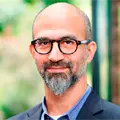
ONLINE COURSE
Circular Economy:
Why enroll in this course?
Be a sustainable innovator in your organization by analyzing circular economies at both corporate and social levels.
Examine circular economies using a systems approach, considering institutional frameworks and policies.
Comprehend the meaning and evolution of circular economies and explore the roles that material science, the economy, institutional structures, and technology play in shaping this concept.

Engage in two live sessions with MIT instructors, and up to eight live sessions with learning facilitators, industry experts, and peers.

Networking opportunities establish professional connections with industry experts and your cohort.

Access to rich supplementary resources provides additional materials and content for a more thorough educational journey.

Certificate
All the participants who successfully complete their program will receive an MIT Professional Education Certificate of Completion, as well as Continuing Education Units (CEUs)*.
To obtain CEUs, complete the accreditation confirmation, which is available at the end of the course. CEUs are calculated for each course based on the number of learning hours.
*The Continuing Education Unit (CEU) is defined as 10 contact hours of ongoing learning to indicate the amount of time they have devoted to a non-credit/non-degree professional development program. To understand whether or not these CEUs may be applied toward professional certification, licensing requirements, or other required training or continuing education hours, please consult your training department or licensing authority directly.
Course outline
By shifting your organization to a Circular Economy, you can ensure growth over time while treating waste as a design flaw. By doing this, we take the outdated linear system and make it circular with resiliency. Circular Economies are emerging as a necessity as the overexploitation of natural resources increases.
What Is a Circular Economy, and Why Is It Important?
Linear Economy and Circular Economy
States Currently Planning for a Circular Economy
Linear and Circular Balance Between Developing and Developed Countries
Biotic (Biological) and Abiotic (Technical) Material and Energy Cycles
Measures of Circularity Across Major Industries
Circular Economy Strategies for Business
Challenges, Debates, Unintended Consequences, and Rebound
Industrial Ecology and Circular Economies
Ecological Economics and Circular Economies
Industry and a Circular Economy in a Changing Climate
A Climate Primer and the Circular Economy
Material and Energy Flows From Decarbonization
Climate Change and the Circular Economy: Key Industrial Sectors
Consumption, Climate Change, and a Circular Economy
Natural Capital Accounting
Implications of Natural Capital Accounting for Businesses and Circular Economies
Public-Private Partnerships
Waste Management and Resource Recovery
Municipal Solid Waste-Resource Recovery
Municipal Wastewater Reuse and Resource Recovery Agricultural Waste Resource Recovery
Opportunities and Challenges in Waste-Recovery Systems
Introduction to Recycling
Traditional Technologies for Waste Management
Established Technologies for Recycling
Emerging and Novel Technologies for Recycling
Figures of Merit for Recycling
Life Support in Space
Modeling Approaches and Tools
Model Scale and Case Studies
Generalized Multi-Commodity Network Flows
The Economic Model for Circularity
Costs and Prices of Recycled Commodities
The Business of Waste Management and Circular Economy
Measuring the Circular Economy
Emerging Metrics for Circularity in Organizations
Technologies for Sensing and Measurement
Data and Analytics for Decisions
Who is this online course for?
Sustainability professionals looking to deepen their understanding of the Circular Economy, either to specialize their careers in this field or become more well-rounded leaders.
Managers from a variety of backgrounds and industries seeking to create sustainable economic growth models for their organizations.
Consultants operating at local, national, and international levels seeking to understand key aspects of sustainability and the circular economy to offer innovative, eco-friendly solutions to clients across diverse sectors.
Professionals in Industries and sectors that are very material-sensitive who want to mitigate negative environmental impacts and seek more sustainable and effective methods for the construction of their materials
Climate Consortium members who aim to accelerate the implementation of large-scale, real-world solutions to address climate change challenges while inspiring transformative climate progress across industries and the globe.
Instructors

Professor of Building Technology Program in the Department of Architecture and Director of MIT Environmental Solutions Initiative

Research scientist, MIT and Adjunct Lecturer in Public Policy, Harvard Kennedy School

Professor of Aeronautics and Astronautics and Engineering Systems, MIT
MIT Professional Education in Numbers
+60K
+155
92%
Frequently Asked Questions
Applicable taxes will be calculated and added at checkout in accordance with country/state regulations.
Didn't find what you were looking for? Schedule a call with one of our Program Advisors or call us at +1 315 602 3089.
Register now and boost your professional trajectory.
Enroll by
